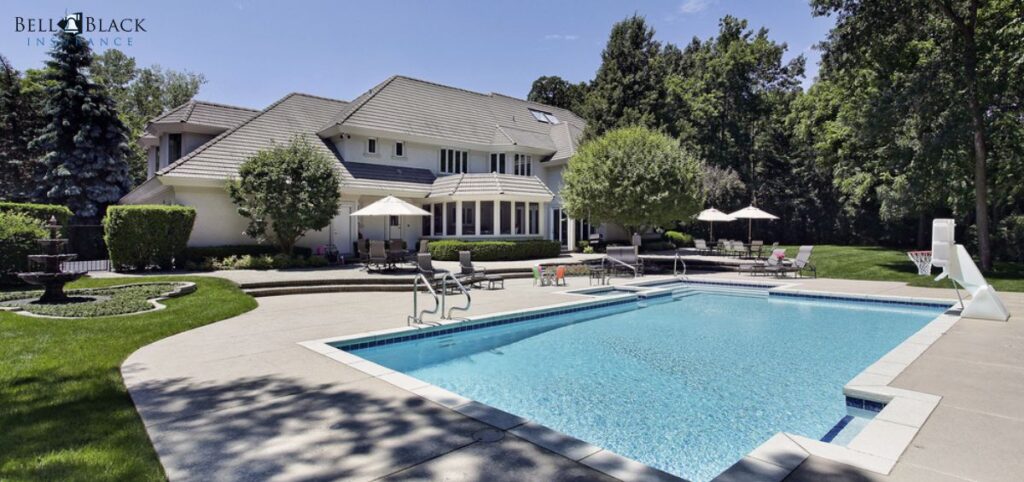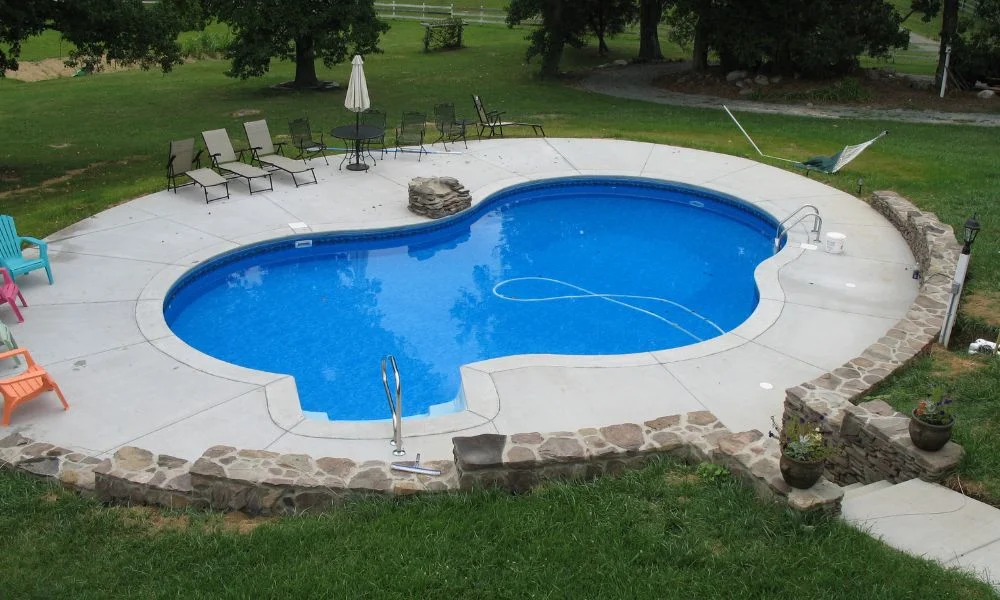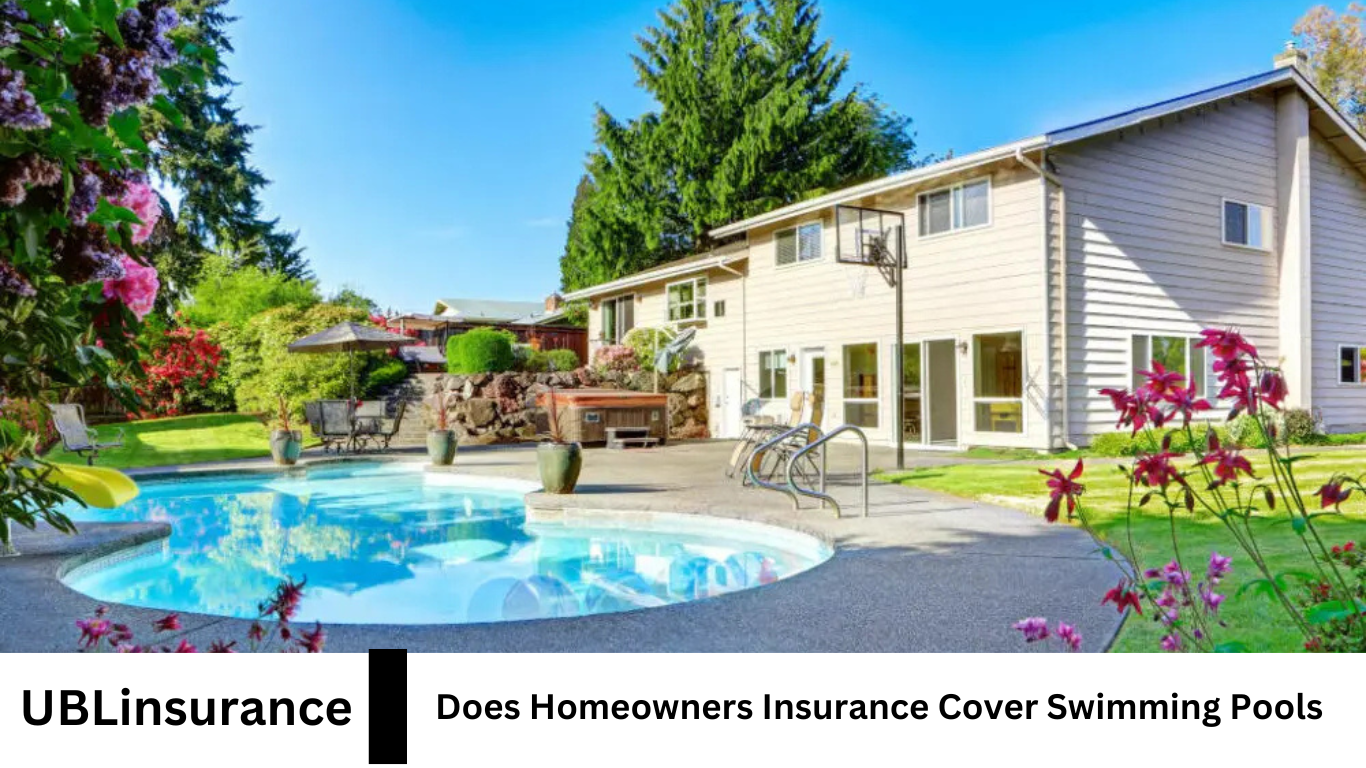Homeowners insurance typically covers swimming pools, but the extent of coverage depends on your policy type and specific circumstances. Most standard policies include liability protection, which helps cover medical expenses or legal costs if someone is injured in or around your pool. Additionally, the pool itself may be covered under the “other structures” or “dwelling” portion of your policy, protecting it from damage caused by covered perils like storms or vandalism.
However, specific exclusions and requirements may apply. Some insurers may require added safety measures, such as fences or pool covers, to maintain coverage. Damage from neglect, wear and tear, or certain natural disasters may not be covered. Coverage may depend on whether your above-ground pool is considered a permanent structure.

To ensure complete protection, it is essential to review your policy, comprehend any risks associated with liability, and contemplate additional coverage options, such as umbrella insurance. Your insurer can clarify the specifics of your swimming pool’s coverage.
Basic Homeowners Insurance Coverage for Swimming Pools
Swimming pools are often considered an added risk factor by insurance companies due to the potential for accidents, especially drownings or injuries. As a result, most standard homeowners insurance policies offer coverage for swimming pools. Still, the level of protection largely depends on the type of insurance you have and the circumstances surrounding an incident.
Personal liability protection is the primary way swimming pools are covered in your policy. If someone is injured in or around your pool, liability coverage can help pay for medical bills, legal costs, and possible settlements if you are sued for negligence. However, while it does cover bodily injuries from accidents, it might not extend to incidents like theft or damage to pool equipment unless specified.
Personal Liability Protection
One of the primary protections your homeowner’s insurance provides is personal liability coverage, which comes into play if someone gets hurt while using your pool. This can include non-family members such as neighbors, guests, or even trespassers who wander into your pool area.
If the injury happens due to unsafe conditions (e.g., slippery pool decks or poorly maintained fences), your personal liability coverage could help cover the cost of medical bills, legal expenses, or compensation if you’re held responsible for the injury. It’s important to note that this coverage typically doesn’t apply to family members or residents of your household—so if a child or family member is injured, this protection won’t cover their medical bills.
Pool Fencing and Safety Requirements
A key requirement for obtaining coverage for your swimming pool under homeowners insurance is ensuring that it meets safety standards. Many insurers require pool owners to have a fence or barrier around the pool to help prevent accidents, especially involving young children or pets. Some states or municipalities may have specific laws or regulations governing pool safety, including requirements for gates with self-latching locks and pool alarms.

For example, if a child trespasses into your yard and gets injured in your pool, the insurer may refuse coverage if the pool does not have the proper safety measures in place. Always consult your insurer before installing a pool to ensure compliance with safety requirements. Regular maintenance of safety features, such as the fence, gates, or pool cover, is also essential in reducing risks and keeping insurance coverage intact.
Additional Pool Coverage Options
While a standard homeowners policy might cover personal liability and property damage to specific areas around the pool, it may not cover damage to the pool itself or pool-related structures. To ensure comprehensive protection, you may need to add endorsements or riders to your policy. These add-ons can provide extra protection tailored explicitly to pool-related risks, including:
- Coverage for damage to the pool: If your pool or related structures (such as pool decks, slides, or fencing) are damaged by a covered peril, like a storm or fire, this coverage will help pay for repairs.
- Pool equipment protection: This covers pool accessories such as pumps, heaters, filters, and cleaning equipment against theft, vandalism, or accidental damage.
Damage to the Pool Itself
One of the most commonly misunderstood aspects of homeowners insurance is that it may not cover damage to the pool itself unless the damage occurs due to a covered peril, such as a storm, fire, or falling tree. If the damage is due to normal wear and tear, neglect, or faulty construction, it is unlikely to be covered under your standard policy.
For example, if your pool’s liner begins to degrade over time, the cost of replacing it falls under your responsibility. However, suppose a heavy windstorm causes a tree to fall into your pool, damaging the structure. In that case, your homeowner’s insurance may help cover the repair costs, as it would fall under “property damage” covered by your dwelling protection.
Vandalism or Theft
Your homeowner’s insurance may provide coverage if your pool equipment or accessories are stolen or damaged due to vandalism. This typically falls under your personal property coverage, which protects belongings on your property. If your pool equipment is damaged, destroyed, or stolen, your insurer may reimburse you for the loss, depending on the specifics of your policy.

For example, if pool cleaning equipment is stolen from your property or your pool heater is vandalized, these items might be covered under personal property coverage. However, it’s essential to check your policy for any limits on coverage for pool-related equipment, as specific policies may have lower limits for outdoor or pool equipment.
Flood Damage and Pools
Flooding is typically excluded from standard homeowners insurance policies, including damage to your pool caused by floods. If your area is prone to flooding or heavy rainstorms, the pool itself may suffer significant damage, and your homeowner’s insurance will not cover this.
If you live in a flood-prone area, consider purchasing a separate flood insurance policy to protect your pool and other structures on your property. Flood insurance is provided through the National Flood Insurance Program (NFIP), and it can cover damage to the pool structure itself, pool equipment, and surrounding landscaping caused by floodwaters.
It’s essential to check whether flood insurance is necessary for your property, mainly if your swimming pool is located in an area that could be affected by seasonal rains or rising water levels.
Swimming Pool Maintenance and Repair
Homeowners insurance generally does not cover the cost of routine maintenance or repairs to your swimming pool. This means if you need to repair a crack in your pool’s surface, fix a broken pump, or replace a filter, your homeowner’s policy will not pay for these expenses.
Maintenance costs are typically the homeowner’s responsibility. However, if damage occurs due to a covered event (like storm damage), your policy may cover the repairs as part of your dwelling protection or property damage coverage. It’s essential to understand that regular upkeep, such as cleaning, pool servicing, and repairs for routine wear, will not be covered by your homeowner’s insurance.
Medical Payments for Family Members
In general, homeowners insurance excludes coverage for medical expenses related to injuries sustained by family members or anyone who resides in the household. Therefore, if a child or family member is injured in the pool, your personal liability coverage will not cover their medical costs.

Some homeowners may choose to add medical payments coverage to their policy, which could help cover small medical expenses for guests injured on the property. However, this extension doesn’t usually cover household members, so if a family member is hurt, you would need to look at other options, such as your health insurance.
How to Ensure Proper Pool Coverage
To ensure you have the proper coverage for your swimming pool, it’s essential to have an open conversation with your insurance provider. When doing so, make sure to:
- Review the liability limits of your policy, particularly if you have high traffic around your pool area or if you frequently host parties or gatherings.
- Add necessary endorsements or riders for additional protection, including coverage for damages to the pool, pool equipment, or injuries that happen around the pool.
- Ensure compliance with safety requirements such as pool fencing and alarms, as insurers may have specific safety rules that need to be followed to qualify for coverage.
- Consider umbrella insurance for additional protection in case of large claims or lawsuits due to pool-related accidents.
Frequently Asked Questions
Does homeowners insurance cover swimming pools?
Yes, most policies cover pools under “other structures” or “dwelling” coverage, but specific terms vary.
Are injuries in my pool covered?
Yes, liability coverage typically pays for medical bills and legal expenses if someone is injured.
Is my above-ground pool covered?
It depends—some insurers classify it as personal property, while others treat it as an “other structure.”
Does insurance cover pool damage from storms?
Yes, if storms are a covered peril in your policy, but flood-related damage may not be included.
Will my premium increase if I have a pool?
This is likely because pools increase liability risks and potential claims.
Are pool-related accidents always covered?
Not always—if negligence or lack of safety measures contributed, the claim may be denied.
Does insurance cover pool leaks or cracks?
Typically, no—damage from wear and tear or neglect is excluded.
What safety features can affect my coverage?
Fences, pool covers, and alarms may be required to qualify for coverage.
Do I need additional coverage for my pool?
An umbrella policy can provide extra liability protection.
Should I inform my insurer about my pool?
Yes, failing to disclose a pool could result in denied claims.
Conclusion
Homeowners insurance generally covers swimming pools, but specific protections depend on your policy. Coverage often includes liability protection for injuries and structural damage from covered perils like storms. However, wear and tear, neglect, and certain disasters, like flooding, are typically excluded. Safety features such as fences and covers may be required to maintain coverage, and owning a pool could increase your insurance premium. If your liability limits are low, an umbrella policy can offer additional protection. Above-ground pools may be classified differently, so checking with your insurer is essential.




